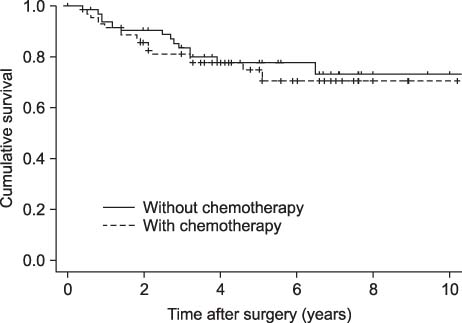J Korean Surg Soc.
2010 Sep;79(3):196-201.
Resection A Surgery: An Exclusion Criterion of Adjuvant Treatment for Gastric Cancer
- Affiliations
-
- 1Department of Surgery, School of Medicine, Kyungpook National University, Daegu, Korea. wyu@knu.ac.kr
Abstract
- PURPOSE
We evaluated the clinical implication of Resection A surgery retrospectively to identify whether quality of surgery can be used as a selection factor for adjuvant therapy in patients with gastric cancer.
METHODS
Prognosis of 902 patients with gastric cancer who underwent Resection A surgery was evaluated.
RESULTS
Among all discharged patients, 77 patients (8.5%) died of recurrent disease, 55 patients (6.1%) died without recurrent disease. Five-year survival rate of all discharged patients was 91.6% and 10-year survival rate 87.1%. Statistically significant prognostic factors were depth of invasion (P<0.001), lymph node metastasis (P<0.001), stage (P<0.001), tumor location (P=0.036) and size (P=0.001), extent of gastric resection (P<0.001), and chemotherapy (P<0.001) on univariate analyses. However, depth of invasion (P=0.001), lymph node metastasis (P<0.001), and total gastrectomy (P<0.001) emerged as statistically significant poor prognostic factor on a multivariate analysis. Adjuvant chemotherapy did not increase the survival rate of patients after Resection A surgery, even in patients with stage II disease.
CONCLUSION
In selecting the patients for adjuvant therapy, both the stage of gastric cancer and the quality of surgery should be considered.
MeSH Terms
Figure
Reference
-
1. Sobin LH, Wittekind C. UICC TNM Classification of Malignant Tumours. 2002. 6th ed. New York: Wiley-Liss.2. Allgayer H, Heiss MM, Schildberg FW. Prognostic factors in gastric cancer. Br J Surg. 1997. 84:1651–1664.3. Hermanek P. Prognostic factors in stomach cancer surgery. Eur J Surg Oncol. 1986. 12:241–246.4. Wittekind C, Greene F, Hutter RVP, Sobin LH, Henson DE. TNM Supplement: A Commentary on Uniform Use. 2003. 3rd ed. New York: Willy-Liss.5. Japanese Gastric Cancer Association. Japanese classification of gastric carcinoma. Gastric Cancer. 1998. 1:2nd English edition. 10–24.6. Pisters PWT, Kelsen DP, Powell SM, Tepper JE. DeVita VT, Hellman S, Rosenberg SA, editors. Cancer of the stomach. Cancer: Principles & Practice of Oncology. 2005. 7th ed. Philadelphia: Lippincott Williams & Wilkins;909–944.7. Cunningham D, Allum WH, Stenning SP, Thompson JN, Van de Velde CJ, Nicolson M, et al. Perioperative chemotherapy versus surgery alone for resectable gastroesophageal cancer. N Engl J Med. 2006. 355:11–20.8. Neri B, Cini G, Andreoli F, Boffi B, Francesconi D, Mazzanti R, et al. Randomized trial of adjuvant chemotherapy versus control after curative resection for gastric cancer: 5-year follow-up. Br J Cancer. 2001. 84:878–880.9. Sakuramoto S, Sasako M, Yamaguchi T, Kinoshita T, Fujii M, Nashimoto A, et al. Adjuvant chemotherapy for gastric cancer with S-1, an oral fluoropyrimidine. N Engl J Med. 2007. 357:1810–1820.10. Kodama Y, Sugimachi K, Soejima K, Matsusaka T, Inokuchi K. Evaluation of extensive lymph node dissection for carcinoma of the stomach. World J Surg. 1981. 5:241–248.11. Cuschieri A, Weeden S, Fielding J, Bancewicz J, Craven J, Joypaul V, et al. Surgical Co-operative Group. Patient survival after D1 and D2 resections for gastric cancer: long-term results of the MRC randomized surgical trial. Br J Cancer. 1999. 79:1522–1530.12. Hartgrink HH, van de Velde CJ, Putter H, Bonenkamp JJ, Klein Kranenbarg E, Songun I, et al. Extended lymph node dissection for gastric cancer: who may benefit? Final results of the randomized Dutch gastric cancer group trial. J Clin Oncol. 2004. 22:2069–2077.13. Degiuli M, Sasako M, Ponti A, Calvo F. Survival results of a multicentre phase II study to evaluate D2 gastrectomy for gastric cancer. Br J Cancer. 2004. 90:1727–1732.14. Jatzko GR, Lisborg PH, Denk H, Klimpfinger M, Stettner HM. A 10-year experience with Japanese-type radical lymph node dissection for gastric cancer outside of Japan. Cancer. 1995. 76:1302–1312.15. Sierra A, Regueira FM, Hernández-Lizoáin JL, Pardo F, Martínez-Gonzalez MA, A-Cienfuegos J. Role of the extended lymphadenectomy in gastric cancer surgery: experience in a single institution. Ann Surg Oncol. 2003. 10:219–226.16. Clinical Practice Guidelines in Oncology. Gastric Cancer Version 2 [Internet]. National Comprehensive Cancer Network. 2009. cited 2009 Jul 1. Fort Washington: National Comprehensive Cancer Network;Available from: http://www.nccn.org/professionals/physician_gls/PDF/gastric.pdf.17. Nakajima T. Gastric cancer treatment guidelines in Japan. Gastric Cancer. 2002. 5:1–5.


